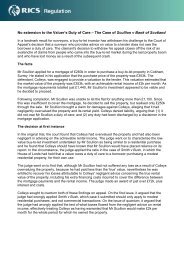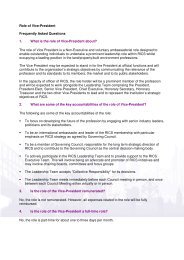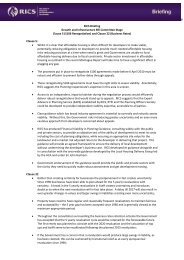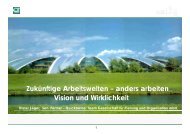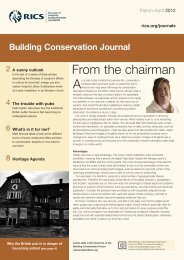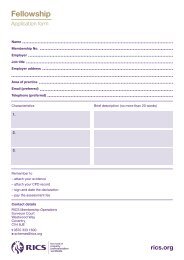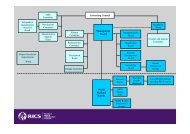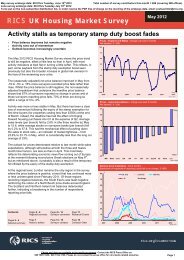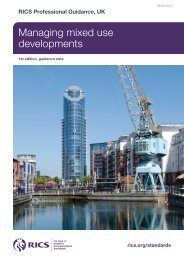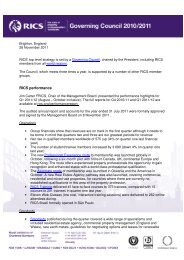Observations on the Oxford Farming Conference 2013 - RICS
Observations on the Oxford Farming Conference 2013 - RICS
Observations on the Oxford Farming Conference 2013 - RICS
Create successful ePaper yourself
Turn your PDF publications into a flip-book with our unique Google optimized e-Paper software.
<str<strong>on</strong>g>Observati<strong>on</strong>s</str<strong>on</strong>g> <strong>on</strong> <strong>the</strong> <strong>Oxford</strong> <strong>Farming</strong> C<strong>on</strong>f <strong>2013</strong> by rural surveyor and<br />
commentator, Rob Yorke F<strong>RICS</strong><br />
If you want to present a high impact speech <strong>on</strong> something affecting <strong>the</strong> countryside,<br />
with associated political implicati<strong>on</strong>s, where better than <strong>the</strong> <strong>Oxford</strong> <strong>Farming</strong> C<strong>on</strong>ference<br />
(OFC ) to give an appropriately named barnstorming speech; I would be surprised if you<br />
haven’t already heard of Mark Lynas via mainstream media over <strong>the</strong> last few weeks.<br />
For, as usual, <strong>the</strong> c<strong>on</strong>ference stimulated and provoked thought <strong>on</strong> a range of topics<br />
from precisi<strong>on</strong> farming, robot tractors and biotechnology (and no, that doesn’t just mean<br />
GM) to improving how farmers communicate, need for Ecological Focus Areas and a<br />
Secretary of State’s first major speech in his new post.<br />
Was <strong>the</strong>re a fly in <strong>the</strong> ointment of this ‘agri-science’ fest? Across <strong>the</strong> road, in a selecti<strong>on</strong><br />
of <strong>Oxford</strong>’s organic latte cafes, The <strong>Oxford</strong> Real <strong>Farming</strong> C<strong>on</strong>ference (ORFC) was<br />
unfurling its wings over <strong>the</strong> same time period <strong>on</strong> what <strong>the</strong>y propose is an ‘alternative’<br />
way to do things. Tweeting, furious at times with hash tags battling it out between<br />
‘macho talk’ at <strong>the</strong> OFC and what <strong>the</strong> ORFC thought was more interesting stuff from<br />
<strong>the</strong>ir venues, chat abounded <strong>on</strong> challenges of Community Supported Agriculture and<br />
permaculture. In my opini<strong>on</strong>, <strong>the</strong> c<strong>on</strong>tents of each c<strong>on</strong>ference are as valid as each<br />
o<strong>the</strong>r, in tackling future food producti<strong>on</strong> at local and global scales. It is just a pity that<br />
<strong>the</strong> two events coincided at <strong>the</strong> same time, even though modern technology does<br />
enable you to feed off both Twitter streams simultaneously.<br />
Owen Paters<strong>on</strong>, Defra’s Secretary of State, is not having a smooth ride. Playing to<br />
powerful English farmers, keeping in with Europe, throwing a b<strong>on</strong>e to <strong>the</strong> GM lobby,<br />
culling an ic<strong>on</strong>ic mammal and holding c<strong>on</strong>servati<strong>on</strong>ists <strong>on</strong> side; this is no easy time to<br />
be a Minister for an Envir<strong>on</strong>ment being fought over by so many. He almost used <strong>the</strong><br />
same sentence as Dacian Ciolos, EU Commissi<strong>on</strong>er for Agric & Rural Development,<br />
addressing <strong>the</strong> c<strong>on</strong>ference last year, when Paters<strong>on</strong> hinted at taxpayers compensating<br />
farmers for <strong>the</strong> provisi<strong>on</strong> of public goods for which <strong>the</strong>re is no market mechanism.<br />
Silence <strong>on</strong> exactly what <strong>the</strong> goods are. On direct payments to farmers, was <strong>the</strong>re<br />
ano<strong>the</strong>r silence that could have been interpreted as <strong>the</strong>se payments dropping over time<br />
as food prices increase and open market mechanisms cut in?<br />
Mairead McGuiness, Irish MEP, made us, here in <strong>the</strong> UK, feel very urban by saying that<br />
90% of her home country thought <strong>the</strong> farming and agri-food sector was an important<br />
mainstay of <strong>the</strong> Irish ec<strong>on</strong>omy. She warned us not to gamble <strong>on</strong> <strong>the</strong> outcome of CAP<br />
negotiati<strong>on</strong>s and that taxpayers will demand that Ecological Focus Areas are part of<br />
farm payments and we should get <strong>on</strong> with bridging <strong>the</strong> divide between NGOs and<br />
farmers. John Luxt<strong>on</strong>, head of New Zealand diary, again turned <strong>the</strong> spotlight <strong>on</strong> his<br />
populati<strong>on</strong> with a poll stating that 90 % of Kiwis thought that dairy was key to <strong>the</strong>ir<br />
ec<strong>on</strong>omy – even if <strong>the</strong>ir agriculture sector c<strong>on</strong>tributed to 50% of <strong>the</strong>ir Greenhouse Gas<br />
emissi<strong>on</strong>s as against a mere 8% from UK agriculture.
Many of <strong>the</strong> speakers tried not to overegg <strong>the</strong> doom-laden prophesy facing humanity of<br />
rising populati<strong>on</strong>s, eating what we like while running out of resources as <strong>the</strong> sea levels<br />
rise. Not all could resist; <strong>on</strong>e int<strong>on</strong>ed <strong>the</strong> outdated Malthusian line that ‘<strong>the</strong>y’re not<br />
making land any l<strong>on</strong>ger’ – which is patently untrue when you look at what H<strong>on</strong>g K<strong>on</strong>g,<br />
<strong>the</strong> Ne<strong>the</strong>rlands and Qatar get up to <strong>on</strong> <strong>the</strong> ‘land creati<strong>on</strong>’ fr<strong>on</strong>t. The phrase sustainable<br />
intensificati<strong>on</strong> did make <strong>the</strong> rounds, though with <strong>the</strong> caveat that it meant different things<br />
in different parts of <strong>the</strong> world. The head of Rothamsted Research spoke of an increase<br />
in yield from 2.5 to 5t/ha in a developing country being just as important as achieving an<br />
increase from 10 to 20t/ha in developed countries. His dry delivery <strong>on</strong> fascinating stuff<br />
from ‘diving deep’ into overcoming nature’s photosyn<strong>the</strong>tic inefficiencies, improving crop<br />
architecture (<strong>the</strong> structure and height of plants), to <strong>the</strong> great neglected subject –<br />
improving soils as a way of c<strong>on</strong>verting yield potential into actual yield. There was so<br />
much talk of soil from many of <strong>the</strong> speakers, yet so little is d<strong>on</strong>e to raise <strong>the</strong> profile of<br />
this taken-for-granted and abused resource.<br />
A man, who has taken abuse and knows about public profile, is <strong>the</strong> pragmatic<br />
envir<strong>on</strong>mentalist Mark Lynas; he could do w<strong>on</strong>ders to champi<strong>on</strong> soil’s lacklustre image.<br />
As a committed anti-GM campaigner, he <strong>on</strong>ce used to rip up GM crops and sling mud at<br />
<strong>the</strong> corporati<strong>on</strong>s behind <strong>the</strong> research. He <strong>the</strong>n had a volte-face and realised that <strong>the</strong><br />
use of science was <strong>the</strong> probably <strong>the</strong> most realistic way forward and that obstructive<br />
celebrity chefs and aristocrats were now <strong>the</strong> thorn in <strong>the</strong> side of progress. The French<br />
resisted <strong>the</strong> potato for decades, refusing to allow it to be grown as it was deemed an<br />
American import. Lynas threw down <strong>the</strong> gauntlet that <strong>the</strong> organic brigade should<br />
remove <strong>the</strong>ir objecti<strong>on</strong> to GM if it was proved to provide a l<strong>on</strong>g term sustainable soluti<strong>on</strong><br />
to feeding <strong>the</strong> world without detrimental impact <strong>on</strong> <strong>the</strong> envir<strong>on</strong>ment.<br />
Farmland birds are a guaranteed talking shop but <strong>the</strong> <strong>on</strong>ly time you might find <strong>the</strong><br />
RSPB in cahoots with chemical companies, MacD<strong>on</strong>alds, <strong>the</strong> NFU, Woodland trust and<br />
Freedom Food, is when <strong>the</strong> UK’s largest c<strong>on</strong>servati<strong>on</strong> organisati<strong>on</strong> is <strong>on</strong>e of <strong>the</strong> OFC<br />
sp<strong>on</strong>sors. It also laid <strong>on</strong> a working breakfast and part financed this year’s <strong>the</strong>med<br />
report: ‘<strong>Farming</strong>’s value to society’. The wide ranging study, perhaps with too broad a<br />
remit, was presented by two professors and <strong>the</strong>n picked apart by a Countryfile<br />
presenter, an ex-adviser to T<strong>on</strong>y Blair and <strong>the</strong> inventor of Open Farm Sunday. There<br />
was some healthy disagreement <strong>on</strong> <strong>the</strong> message to be communicated by farmers; were<br />
<strong>the</strong>y to c<strong>on</strong>nect society by showing up <strong>the</strong> various tradeoffs in keeping supermarkets<br />
rammed with affordable food or challenge <strong>the</strong>mselves, as farmers, to set an example of<br />
a future industry making a profit while providing wider envir<strong>on</strong>mental and public<br />
benefits?<br />
Futuristic science dominated <strong>the</strong> talks. If Lynas had set <strong>the</strong> benchmark in challenging us<br />
to use <strong>the</strong> science our disposal, <strong>the</strong> Royal Agricultural Society of England’s CEO<br />
infused us with imaginary visi<strong>on</strong>s of driverless tractors tracking silently across <strong>the</strong><br />
landscape, while Jake Freest<strong>on</strong>e, an avid Twitter farmer, showed us short films of how<br />
precisi<strong>on</strong> farming can reduce inputs, minimise soil compacti<strong>on</strong> and maximise profits.<br />
Over at ORFC <strong>the</strong> top man at Riverford Organic Farms, Guy Wats<strong>on</strong>, was c<strong>on</strong>fessing to<br />
be a reluctant capitalist, and told delegates that while <strong>the</strong> glamour had g<strong>on</strong>e out of<br />
organics since its 2008 peak, we shouldn’t ignore <strong>the</strong> business model and could try and<br />
find ways to make co-ops not favour <strong>the</strong> least inefficient producers.
There was plenty of palpable passi<strong>on</strong> to be found in a ‘slow food’ sort of way that<br />
absorbs <strong>on</strong>ly a miniscule slice of <strong>the</strong> c<strong>on</strong>sumer £84 billi<strong>on</strong> spend <strong>on</strong> food and drinks –<br />
centred mainly <strong>on</strong> supermarket and ‘fast food’ outlets. The moot point around which<br />
much of <strong>the</strong> arguments are set, are <strong>the</strong> levels of output and land space required for food<br />
producti<strong>on</strong> systems while not impacting <strong>on</strong> ‘space for nature’ and not exporting a<br />
potential problem elsewhere.<br />
For all this science, <strong>the</strong>re’s no replacement for <strong>the</strong> lifeblood required to keep a living<br />
and breathing countryside alive - as <strong>the</strong> Prince of Wales reminded us via a video link.<br />
There’s an urgency to get new entrants into <strong>the</strong> farming industry without which <strong>the</strong><br />
countryside will start to fail, and <strong>the</strong> OFC was pressing all <strong>the</strong> butt<strong>on</strong>s; ‘Bright Crop’ is<br />
an initiative to promote positive percepti<strong>on</strong>s to teenagers about farming and <strong>the</strong> Minister<br />
David Heath launched The Future of <strong>Farming</strong> Group to look into ways of making it a<br />
more attractive career choice. Answers <strong>on</strong> <strong>the</strong> back your <strong>RICS</strong> subscripti<strong>on</strong> envelope<br />
please.<br />
One of <strong>the</strong> speakers said that although society may value farmers, it fears actually<br />
meeting <strong>the</strong>m face to face! Perhaps this reflects our disc<strong>on</strong>nect from a high jacked<br />
‘greenwash’ image of a working countryside that we, rural chartered surveyors, must aid<br />
and abet farmers in assisting <strong>the</strong>m to face up to and deal with <strong>the</strong> challenges ahead.<br />
Rob Yorke F<strong>RICS</strong> Agree or disagree with him via twitter.com/blackgull





